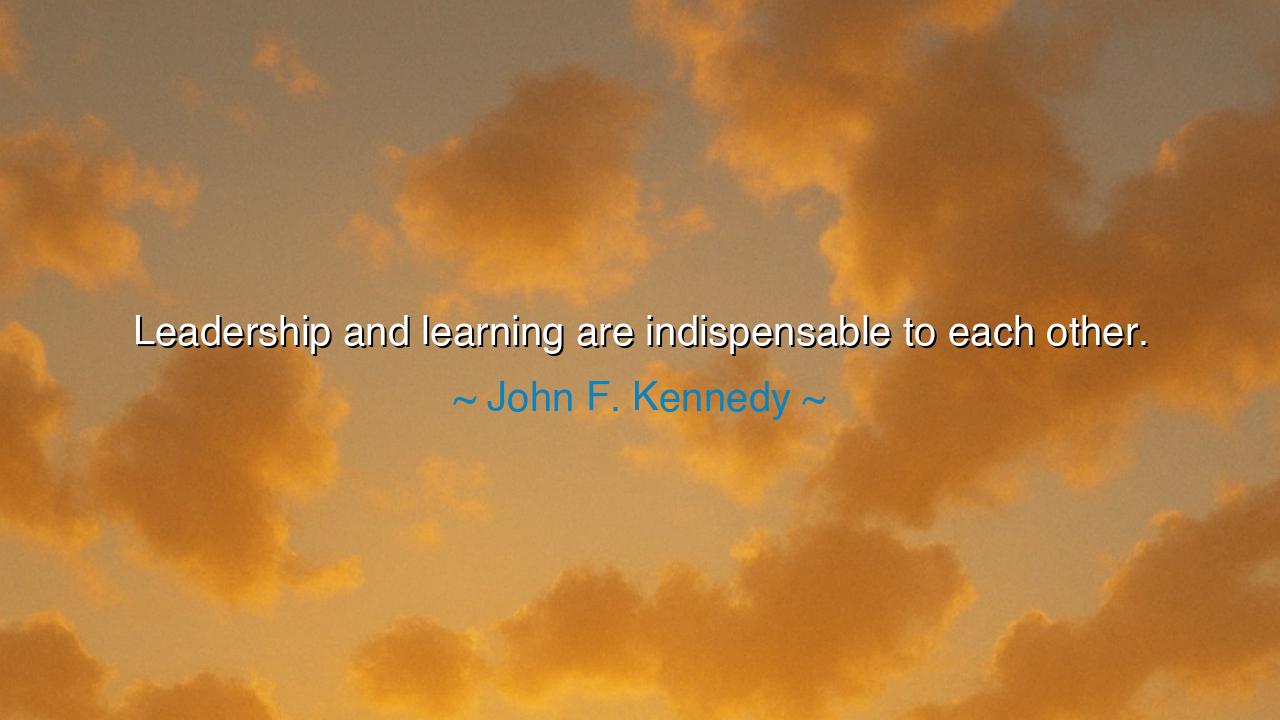
Leadership and learning are indispensable to each other.






The words of John F. Kennedy, “Leadership and learning are indispensable to each other,” ring with the power of timeless truth, spoken by a man who bore the weight of a nation upon his shoulders. In these words, Kennedy declares that leadership without the humility to learn becomes arrogance, and learning without the courage to lead becomes passivity. The two are bound together like flame and light—one giving direction, the other giving power. A true leader is not one who knows everything, but one who is ever willing to grow, to question, to adapt, and to be instructed by both success and failure.
The ancients themselves bore witness to this law. Plato wrote that the wisest rulers would be those who loved wisdom above all else, philosopher-kings who never ceased to learn. Marcus Aurelius, though emperor of Rome, filled his private journals with reminders to be a student of life, ever humble before truth. For they knew that the moment a leader ceases to learn, he ceases also to lead, for he becomes trapped in the prison of yesterday’s knowledge, blind to the needs of today.
Kennedy himself lived this creed. Confronted by the Cuban Missile Crisis, he did not act in haste or pride, as some urged. Instead, he gathered counsel, studied deeply, weighed the lessons of history, and learned even from his adversaries. In doing so, he guided the world away from the brink of nuclear war. His leadership was not born from stubborn certainty, but from his willingness to learn swiftly, humbly, and wisely under pressure. In this, he showed that the strength of a leader is not in pretending to know all, but in learning enough to act rightly.
History offers other shining examples. Abraham Lincoln, though mocked for his lack of formal education, read tirelessly, listened to all voices—even his critics—and shaped himself into a statesman of immense wisdom. His learning refined his leadership, and his leadership demanded even deeper learning. It was this cycle that allowed him to preserve the Union and transform the nation. Contrast this with leaders who refused to learn, who clung to old dogmas, and led their people into ruin. The difference is stark: learning sustains leadership, while ignorance destroys it.
The meaning of Kennedy’s words is both noble and demanding. They teach us that leadership is not a fixed crown, but a living duty, nourished by learning. A leader who continues to learn remains fresh, relevant, and wise; a leader who stops learning grows stale, proud, and blind. Likewise, learning finds its highest purpose when it fuels the service of leadership—when knowledge is not hoarded but used to guide, to inspire, and to elevate others.
The lesson for us is clear: whether or not we hold titles, we all lead in some way—our families, our communities, our work, even our own lives. And for each of us, learning must never cease. To lead well, we must read widely, listen humbly, reflect deeply, and be ever ready to admit when we are wrong. Leadership is not the end of learning; it is the ultimate test of whether our learning has prepared us to serve.
The practical action is this: commit yourself to being both a leader and a learner. Read not only to know, but to grow. Listen not only to reply, but to understand. When you make mistakes, learn from them quickly, and let others see in you the humility to adapt. If you aspire to leadership, make learning your daily bread; if you hunger for learning, let leadership be the field where your knowledge bears fruit.
Therefore, O listener, engrave these words of Kennedy upon your soul: “Leadership and learning are indispensable to each other.” Do not separate what the wise have joined. For in the union of these two lies the secret of enduring greatness: a heart humble enough to learn, and a spirit brave enough to lead.






AAdministratorAdministrator
Welcome, honored guests. Please leave a comment, we will respond soon